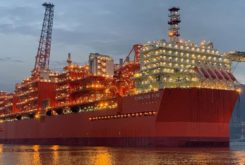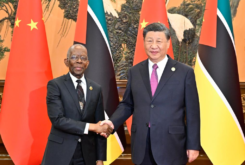Through a vast network of family-owned companies, Mozambique´s Transport and Communications minister, Carlos Mesquita, is one of the sector´s key players and an influential figure in the ruling party, Frelimo, despite his detractors.
Accusations, over the last years, of improper accumulation of public functions with private interests – directly and through his family – have not hampered his vast influence in Frelimo, where he is a member of the Central Committee.
Considered one of the country´s main experts in Transports and Logistics, Mesquita was able to keep his influence and family businesses untouched, and play an active political role in the party and in the presidential transition initiated in 2014, from Armando Guebuza to Filipe Nyusi.
Mesquita´s business is mainly focused on the rail-port logistics sector, but according with reliable sources he also have interests in natural gas development projects.
Currently, around a dozen companies are known to be wholly or partly owned by Mesquita or by his brothers Celso, Adelino (deceased), Joaquim, Célia, Leonel, Paulo Jorge and José Manuel.
The business network includes Transportes Carlos Mesquita (TCM, freight transport – 1998), Danimo Service System (2008), Grupo Mesquita (2015), Mespar (2013), CONSEL (consultant, 1996) and Multiservices (logistics, 2008).
Other family companies include Beira Grain Terminal (cereals, 2007), Nectar Moçambique (handling), Merec Industries (agriculture, 1998), Sermoz (2018), Mozambique Logistic Park (2015, a partnership with the Guebuza family) and Cornelder Quelimane (logistics, 2004).
The role of his brothers in the family business served as a “protective barrier” for Mesquita, according to our sources,
When Mesquita faced accusations of violation of the Public Probity Law due to the signing by the Ministry of Transport and Communications of contracts with the companies run by his family, namely in the ports of Maputo, Beira, Nacala and Quelimane his brothers became his protective barrier.
Mesquita was unscathed by the case, holding on as minister after the process was closed by the Central Office to Combat Corruption, in 2016.
Mesquita´s role, and that of family companies, have been particularly prominent in the Beira port, the second largest in the country, and its logistics corridor (CBD), that stretches west to the border, and is a key trade infrastructure for landlocked neighbour countries.
With significant international funding in the 1980s and 1990s – close to USD 500 million through more than 70 projects – the port of Beira is today one of the most modern port infrastructure in Africa.
The Special Development Program (PDE) of the Ministry of Transport and Communications (2018) includes 8 projects for the construction and rehabilitation of infrastructures and communication routes in the CDB, estimated at about USD 1 billion.
The funding model should be public-private, with the exception of two projects to be implemented in the border area with Zimbabwe and funded by the two governments.
The importance of the CBD as a priority structuring project is seen in the sector as growing.
Strategically, the CBD, linking Beira to Zimbabwe, will benefit from possible stabilization of the political and economic situation in Harare and could become central in supplies to Tanzania, Zambia, Botswana and even Democratic Republic of the Congo.
The port of Beira supplies almost all of the goods circulating in the CBD: fertilizers, liquid fuels, phosphates, agricultural products and ores, namely coal.
The operation and management of the Port of Beira terminals was granted for a period of 25 years – and extended in 2018 until 2038 – to Cornelder de Moçambique, SA (CdM) consisting of Cornelder Corporation Moçambique BV, registered in the Netherlands (67% of the capital) and Mozambique’s Ports and Railways (33% of the capital).
The political assessment of Cornelder’s performance is generally favorable: the number of employees has more than doubled since the start of the concession (to 700) and indirect jobs, through subcontractors, are estimated at c. 4,000.
The volume of cargo at the Beira container terminal increased significantly from 32,700 TEU (unit of 20 feet) to 218,8 thousand TEU, the same happening in the general cargo terminal, from 467 thousand TEU to 2.6 million TEU.
Carlos Mesquita held a number of public positions, but starting in 1995 it was mainly in business that he excelled.
Following a positive performance as CFM executive, Mesquita was chosen by Caminhos de Ferro de Moçambique (CFM) for Cornelder de Moçambique, a joint venture between the Dutch company Cornelder BV and CFM, which was awarded the management concession for the Port of Beira in 1998.
Directly linked to his rise is Rui Fonseca, former director of CFM´s in the Center of the country, when Armando Emílio Guebuza (AEG) was Minister of Transport. it was Fonseca who promoted Carlos Mesquita’s studies in the Netherlands, and both later joined in the creation of Cornelder de Moçambique.
Mesquita was in CdM´s board until he became minister, and was succeeded by his brother Adelino, who died in 2018 in an aviation accident.
Divorced and with 6 children, Carlos Mesquita, 56, was born in Zambézia, graduated in mechanical engineering from Eduardo Mondlane University.
He completed his specialization in merchant navy in the Netherlands in the 1990s, and became a Dutch honorary consul in Beira for 5 years, after joining CFM, where he also worked with the current president, Filipe Nyusi.
In fact, the relationship between Mesquita and Nyusi goes back to childhood – they were classmates in Beira.(CLBrief)



